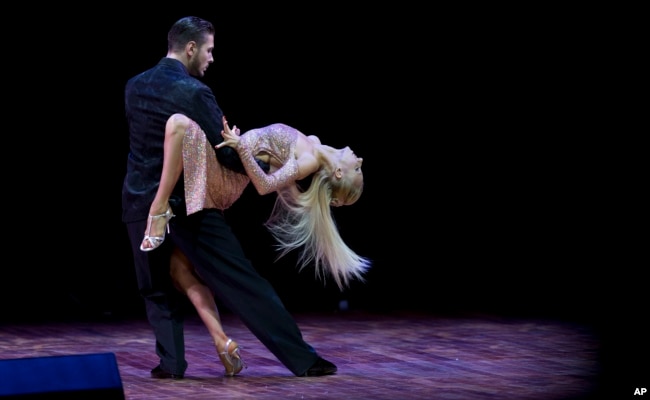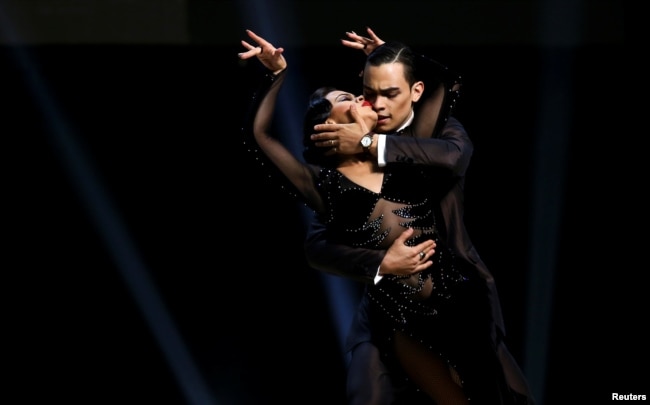タンゴを踊るには2人必要?ことわざ
VOAラーニングイングリッシュの「Words and Their Stories」です。
今日のプログラムの表現は:It takes two to tango!
'It Takes Two to Tango' 両者に責任がある
Sometimes 'It Takes Two to Tango'
October 10, 2020
タンゴは南米のダンスで、二人の間で情熱的に感情をこめて踊るものです。
今日のプログラムの表現は:It takes two to tango!
ということで、タンゴをやってみましょう......表現で。
タンゴのように、ある行動や活動には二人がかりのものがあります。一人ではできない。ケンカのように。口喧嘩でも殴り合いでも、自分との喧嘩は、本当に馬鹿らしく見えますよね。一人でタンゴをするのもバカらしく見えるかもしれません。
私たちはよく、"it takes two to tango "という表現を使って、二人の人や二人の当事者が同じように非難されるような難しい状況を表現します。また、二人の人や二人の当事者が何かを成し遂げるために責任を負っているときにも、この表現を使います。
例えば、米国のいくつかの改革は、両方の当事者が一緒にする必要があります。結局のところ、 it takes two to tango
タンゴを踊るには2人必要。
主語を省略して、"takes two to tango. "と表現を短くすることもあります。
他にも例があります。
この問題は我々みんなで協力して解決する必要があります。さもなくば、解決は決して見つからないでしょう。諺にもあるように“it takes two to tango.’’ですね。
このプロジェクトは一人では大きすぎます。 手を貸しましょう。 Takes two to tango!
似たような表現があります。また、何かに二人が関わっていることを意味します。それが"two can play at that game "という表現、一人がやったことを他の人もできるという意味です。私たちはこの表現を使って、その行為に自分たちを巻き込むのです:誰かがやっているのと同じことを、私たちもやろうとするのです。(そっちがその気ならこっちにも考えがあるわ)
例えば、誰かがあなたにいたずらをしているとしましょう。彼らはあなたに水で満たされた風船を投げると、あなたはびしょ濡れになりますね。「“Two can play at that game!”!」とあなたが叫んで、そして、あなたは水風船を投げつけるのです。
普通は「お返しするわ」みたいな感じで使います。
例を挙げてみましょう。
ねぇ、あなたがデザイン部門の新しい仕事に就きたいのは分かっていまわ。だから、ダリルのことを教えてあげましょう。
彼もその仕事がしたいんでしょ?
そうよ。でね、 彼はボスをフットボールの試合に招待したの。
そうなの? じゃ、two can play at that game.
そっちがその気ならこっちにも考えがあるわ
私はボスをカラオケに招待するわ。
ボスは歌わないと思うわよ。
まぁ、 サッカーカラオケ?
それはないと思うけど... 考えてみて。
さて、私たちの最初の表現に戻りますね - – it takes two to tango. 言語を学ぶことは、一人では難しいですね。ですから、Words and Their Stories来週もここで参加してくださいね。結局のところ、タンゴには二人が必要なのですから。
ねえ このダンスはどう?
なぜ?
二人で踊れるから
タンゴには二人、タンゴには二人
恋愛感情を真に受けるための二人
単語を踊ろう、踊ろう
愛のダンスをしよう!
Sometimes 'It Takes Two to Tango'
 Couples dance before the announcement of the winners in the stage category at the World Tango Championship final in Buenos Aires, Argentina, Wednesday, Aug. 23, 2017. (AP Photo/Natacha Pisarenko)
Couples dance before the announcement of the winners in the stage category at the World Tango Championship final in Buenos Aires, Argentina, Wednesday, Aug. 23, 2017. (AP Photo/Natacha Pisarenko)
And now, Words and Their Stories, from VOA Learning English.
The tango is a South American dance that is passionate and emotionally intense between two people.
Our expression for today’s program is: It takes two to tango!
So, let’s do the tango … in an expression.
Like the tango, some actions or activities take two people. You can’t do them alone. Like a fight. Fighting with yourself, whether a verbal argument or a fist fight, would look really silly! And doing the tango by yourself might look silly too.
We often use the expression “it takes two to tango” to describe a situation, usually a difficult one, where two people or two parties are equally to blame. We also use this expression when two people or two parties are responsible for getting something done.
For example, some reforms in the United States will need both parties to come together. After all, it takes two to tango.
Sometimes we shorten this expression by leaving out the subject and say, “takes two to tango.”
Here are more examples.
We need to work together on this problem, or we will never find a solution. Like the saying goes, “it takes two to tango.’’
This project is too big for one person. I’ll help you. Takes two to tango!
We have a similar expression. It also means that two people are involved in something. The expression “two can play at that game” means what one person does, another can do too. We use this expression to involve ourselves in the action: We are going to do the same thing that someone else is doing.
Let’s say, someone plays a trick on you. They throw a balloon filled with water at you and you get soaked. You shout, “Two can play at that game!” And then you throw a water balloon at them!
Usually we use this in an “I will get you back” kind of way.
Here’s an example.
Look I know that you want the new job in the design department. So, I’m going to tell you something – something about Daryl.
He wants the job too, doesn’t he?
Yes. And he just invited the boss to a football game.
Did he. Well, two can play at that game. I will invite the boss … to … karaoke night.
I don’t think the boss sings.
Oh. Football karaoke?
I don’t think that’s a thing. But keep thinking.
Now back to our first expression – it takes two to tango. Learning a language is difficult to do alone. So, join me here again next week for another Words and Their Stories. After all, it takes two to tango!
Until next time, I'm Anna Matteo.
________________________________________________________________
Words in This Story
passionate – adj. having, showing or expressing strong emotions or beliefs
verbal – adj. spoken rather than written words
fist fight –n. a fight in which people hit each other with their fists
silly – adj. having or showing a lack of thought, understanding, or good judgement
soaked – adj. made completely wet

